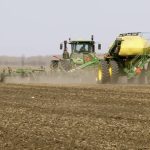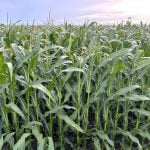
Tag Archives soil health

Alberta agronomist sees both sides of regenerative agriculture
Author Scott Gillespie offers producers advice on how to practically apply the soil regeneration movement to their farms

Black tables soil health protection bill in Senate
Legislation would recognize soil as a strategic national asset

Saskatchewan Crop Report: Seeding ahead of average pace
18 per cent of Saskatchewan crop planted

FEED ME: Can well-fed plants fend off diseases and insects?
We examine an Idaho farmer’s program for crop self-defence
Cover cropping requires intention
Science Brief: Keep your goals in mind

Soil health benchmarking survey in Alberta
Researchers at the Chinook Applied Research Association’s Soil Health Lab have adapted a soil health assessment from Cornell University to evaluate Alberta soils

Supersized grain carts a weighty problem
They can boost harvest efficiencies, but also ramp up risk of serious soil compaction. Here are some tips to reduce that risk

Getting greener: How Prairie cereals have reduced their carbon footprint
Reports shed new light on Prairie cereal growers’ work implementing best practices

Cropland threatened by toxic metals: study
Up to 17 per cent of agricultural land at risk

Saskatchewan farm making compost pellets for added fertilizer
After years of trials, Kyle Heggie thinks his system is crop-ready


